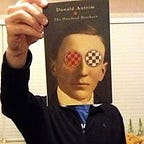The Road Not Taken
Here’s a very famous poem by the American poet Robert Frost:
“The Road Not Taken”
Two roads diverged in a yellow wood,
And sorry I could not travel both
And be one traveler, long I stood
And looked down one as far as I could
To where it bent in the undergrowth;
Then took the other, as just as fair
And having perhaps the better claim,
Because it was grassy and wanted wear;
Though as for that the passing there
Had worn them really about the same,
And both that morning equally lay
In leaves no step had trodden black.
Oh, I kept the first for another day!
Yet knowing how way leads on to way,
I doubted if I should ever come back.
I shall be telling this with a sigh
Somewhere ages and ages hence:
Two roads diverged in a wood, and I —
I took the one less traveled by,
And that has made all the difference.
It’s usually interpreted to be about the kinds of choices we often make in life. We reach these junctions and have to decide which way to go. On what basis do we make our decisions? Do we try to go the way most people do or do we want to be more individualistic in our choices? We sometimes think we can come back and choose the other way and see what it would have been like, but the way life works, ‘knowing how way leads on to way,’ that is rarely possible. What will we think about the choices that we’ve made when we look back on our lives in the future? What do we think will be the choice that made all the difference?
Education is something that can open up new paths for you to go down, but the increased choice can also be scary: what do you want to do with your life?
I think about education a lot, obviously, because it’s my job. I see lots of new students every year and I get to see students grow and discover new things. I have to think about the best ways to help you guys expand your minds and make the most of the opportunity that you have at high school.
Often I think that students are too locked down in their education, too constrained by the curriculum and by assessment tasks to fully develop in the most interesting ways. My hope this year is to get you to read some interesting ideas and expand your minds in different directions. Some of those things are on the curriculum, like the Shakespeare play Othello.
This blog, though, is for things that aren’t set texts. It’s a chance for me to explore some of the things that interest me and I want all of you to create blogs that will also allow you to explore some of your own ideas and develop your own writing.
This is a compulsory part of my English class that everyone will participate in, but it’s outside of the assessment. I believe that if you make the most of this task it will have the instrumental effect of improving your grades in English (after all, the more we practice a skill the better we get at it, and that certainly holds true for reading and writing (although some people argue that it’s not quite as simple as that)). But beyond that, I believe it is intrinsically valuable to read widely and express your ideas in writing. That is, it’s a good thing in itself, not for anything else it may bring you (like good grades, or money, or fame).
So I will set you various reading and writing tasks here. Your first task is to read these two 2017 articles from The Guardian:
‘In an age of robots, schools are teaching our children to be redundant,’ by George Monbiot
and
‘What does the future hold for students starting university today?’ by Elle Hunt and Naaman Zhou
I’d also like you to read this 2017 article by Catherine Deveny:
On Teenagers, ATAR Results and Young People
and this New York Times article from 2018:
What Straight-A Students Get Wrong
These are long articles that you might be tempted to respond to with tl;dr but I would like you to take the time to read them carefully. After all, they’re about your present and your future.
After you’ve read them I would like you to create an account here on Medium (you must not use your real name or have any identifying features about yourself on the account).
AND then I’d like you to express your own views about education. You might like to respond directly to some of the points raised in the articles (or in the poem above). You could write about what you hope to get from your education at Melbourne High School. You could write about your experiences of the Australian education system so far. Just so long as you write about education I’ll be satisfied. No word limits, but give it a good go to show me what you’re capable of.
There is one particular thing I’d like you to have a go at. Look carefully at how the articles I’ve asked you to read are written and how this one is written. One thing you might notice is that because we’re writing online we’re able to make use of hyperlinks, to take readers in different directions and allow them to follow up on some of the ideas mentioned. These can be purely explanatory or whimsical or allow for further reading on the topic. See if you can include at least four or five links in your piece of writing. Try to go to more interesting sites than just Wikipedia (although Wikipedia is an amazing and very useful site).
